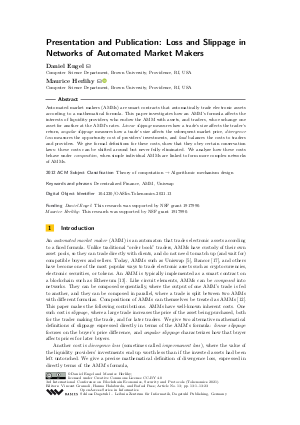Presentation and Publication: Loss and Slippage in Networks of Automated Market Makers
Authors
Daniel Engel,
Maurice Herlihy 
-
Part of:
Volume:
3rd International Conference on Blockchain Economics, Security and Protocols (Tokenomics 2021)
Part of: Series: Open Access Series in Informatics (OASIcs)
Part of: Conference: International Conference on Blockchain Economics, Security and Protocols (Tokenomics) - License:
 Creative Commons Attribution 4.0 International license
Creative Commons Attribution 4.0 International license
- Publication Date: 2022-03-18
File

PDF
OASIcs.Tokenomics.2021.13.pdf
- Filesize: 0.8 MB
- 23 pages
Document Identifiers
Subject Classification
ACM Subject Classification
- Theory of computation → Algorithmic mechanism design
Keywords
- Decentralized Finance
- AMM
- Uniswap
Metrics
- Access Statistics
-
Total Accesses (updated on a weekly basis)
0Document
0Metadata
Abstract
Automated market makers (AMMs) are smart contracts that automatically trade electronic assets according to a mathematical formula. This paper investigates how an AMM’s formula affects the interests of liquidity providers, who endow the AMM with assets, and traders, who exchange one asset for another at the AMM’s rates. Linear slippage measures how a trade’s size affects the trader’s return, angular slippage measures how a trade’s size affects the subsequent market price, divergence loss measures the opportunity cost of providers' investments, and load balances the costs to traders and providers. We give formal definitions for these costs, show that they obey certain conservation laws: these costs can be shifted around but never fully eliminated. We analyze how these costs behave under composition, when simple individual AMMs are linked to form more complex networks of AMMs.
Cite As Get BibTex
Daniel Engel and Maurice Herlihy. Presentation and Publication: Loss and Slippage in Networks of Automated Market Makers. In 3rd International Conference on Blockchain Economics, Security and Protocols (Tokenomics 2021). Open Access Series in Informatics (OASIcs), Volume 97, pp. 13:1-13:23, Schloss Dagstuhl – Leibniz-Zentrum für Informatik (2022)
https://doi.org/10.4230/OASIcs.Tokenomics.2021.13
BibTex
@InProceedings{engel_et_al:OASIcs.Tokenomics.2021.13,
author = {Engel, Daniel and Herlihy, Maurice},
title = {{Presentation and Publication: Loss and Slippage in Networks of Automated Market Makers}},
booktitle = {3rd International Conference on Blockchain Economics, Security and Protocols (Tokenomics 2021)},
pages = {13:1--13:23},
series = {Open Access Series in Informatics (OASIcs)},
ISBN = {978-3-95977-220-4},
ISSN = {2190-6807},
year = {2022},
volume = {97},
editor = {Gramoli, Vincent and Halaburda, Hanna and Pass, Rafael},
publisher = {Schloss Dagstuhl -- Leibniz-Zentrum f{\"u}r Informatik},
address = {Dagstuhl, Germany},
URL = {https://drops.dagstuhl.de/entities/document/10.4230/OASIcs.Tokenomics.2021.13},
URN = {urn:nbn:de:0030-drops-159103},
doi = {10.4230/OASIcs.Tokenomics.2021.13},
annote = {Keywords: Decentralized Finance, AMM, Uniswap}
}
Author Details
Funding
- Engel, Daniel: This research was supported by NSF grant 1917990.
- Herlihy, Maurice: This research was supported by NSF grant 1917990.
References
- Jacob Abernethy, Yiling Chen, and Jennifer Wortman Vaughan. An optimization-based framework for automated market-making. In Proceedings of the 12th ACM conference on Electronic commerce - EC '11, page 297, San Jose, California, USA, 2011. ACM Press. URL: https://doi.org/10.1145/1993574.1993621.
- Hayden Adams, Noah Zinsmeister, and Dan Robinson. Uniswap v2 core. https://uniswap.org/whitepaper.pdf, March 2020. As of 8 February 2021.
- Guillermo Angeris and Tarun Chitra. Improved Price Oracles: Constant Function Market Makers. SSRN Electronic Journal, 2020. URL: https://doi.org/10.2139/ssrn.3636514.
- Guillermo Angeris, Alex Evans, and Tarun Chitra. When does the tail wag the dog? Curvature and market making. arXiv:2012.08040 [q-fin], December 2020. URL: http://arxiv.org/abs/2012.08040.
- Guillermo Angeris, Hsien-Tang Kao, Rei Chiang, Charlie Noyes, and Tarun Chitra. An analysis of Uniswap markets. arXiv:1911.03380 [cs, math, q-fin], February 2021. URL: http://arxiv.org/abs/1911.03380.
- Jun Aoyagi. Lazy Liquidity in Automated Market Making. SSRN Electronic Journal, 2020. URL: https://doi.org/10.2139/ssrn.3674178.
- Bancor. Proposing bancor v2.1: Single-sided amm with elastic bnt supply. https://blog.bancor.network/proposing-bancor-v2-1-single-sided-amm-with-elastic-bnt-supply-bcac9fe655b, October 2020. As of 8 February 2021.
- Massimo Bartoletti, James Hsin-yu Chiang, and Alberto Lluch-Lafuente. A theory of Automated Market Makers in DeFi. arXiv:2102.11350 [cs], April 2021. URL: http://arxiv.org/abs/2102.11350.
-
Yiling Chen and David M. Pennock. A utility framework for bounded-loss market makers. In Proceedings of the Twenty-Third Conference on Uncertainty in Artificial Intelligence, UAI'07, pages 49-56, Arlington, Virginia, USA, 2007. AUAI Press.

- Yiling Chen and Jennifer Wortman Vaughan. A new understanding of prediction markets via no-regret learning. In Proceedings of the 11th ACM Conference on Electronic Commerce, EC '10, pages 189-198, New York, NY, USA, 2010. Association for Computing Machinery. URL: https://doi.org/10.1145/1807342.1807372.
- Michael Egorov. Stableswap - efficient mechanism for stablecoin liquidity. https://www.curve.fi/stableswap-paper.pdf, November 2019. As of 8 February 2021.
- Daniel Engel and Maurice Herlihy. Composing Networks of Automated Market Makers. arXiv:2106.00083 [cs], June 2021. URL: http://arxiv.org/abs/2106.00083.
- Gavin Wood. Ethereum: A secure decentralised generalised transaction ledger, July 2021. URL: https://ethereum.github.io/yellowpaper/paper.pdf.
- Robin Hanson. Combinatorial Information Market Design. Information Systems Frontiers, 5(1):107-119, January 2003. URL: https://doi.org/10.1023/A:1022058209073.
- Robin Hanson. Logarithmic market scoring rules for modular combinatorial information aggregation. Journal of Prediction Markets, 1(1):3-15, 2007. URL: https://EconPapers.repec.org/RePEc:buc:jpredm:v:1:y:2007:i:1:p:3-15.
- Hayden Adams, Noah Zinsmeister, Moody Salem, River Keefer, and Dan Robinson. Uniswap v3 Core, March 2021. URL: https://uniswap.org/whitepaper-v3.pdf.
- Eyal Hertzog, Guy Benartzi, and Galia Benartzi. Bancor protocol. https://whitepaper.io/document/52/bancor-whitepaper, 2017.
-
Fernando Martinelli and Nikolai Mushegian. Balancer: A non-custodial portfolio man- ager, liquidity provider, and price sensor. https://balancer.finance/whitepaper/, 2109. As of 2 February 2021.

-
Andreu Mas-Collell, Michael Whinston, and Jerry R. Green. Microeconomic Theory. Oxford University Press, 1995.

- Pintail. Uniswap: A good deal for liquidity providers? URL: https://medium.com/@pintail/uniswap-a-good-deal-for-liquidity-providers-104c0b6816f2.
- Mohsen Pourpouneh, Kurt Nielsen, and Omri Ross. Automated Market Makers. IFRO Working Paper 2020/08, University of Copenhagen, Department of Food and Resource Economics, July 2020. URL: https://ideas.repec.org/p/foi/wpaper/2020_08.html.
- wikipedia. Beta distribution. https://en.wikipedia.org/wiki/Beta_distribution. As of 11 August 2021.
- Yi Zhang, Xiaohong Chen, and Daejun Park. Formal specification of constant product (x . y = k) market maker model and implementation. https://github.com/runtimeverification/verified-smart-contracts/blob/uniswap/uniswap/x-y-k.pdf, 2018.
